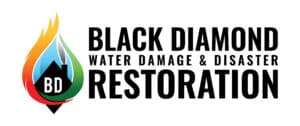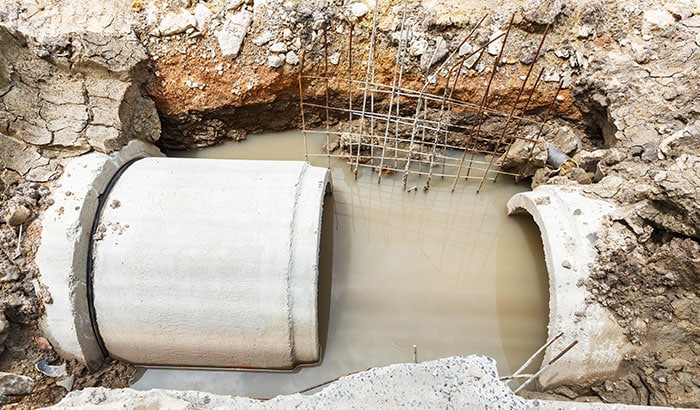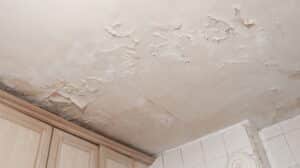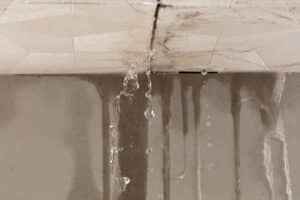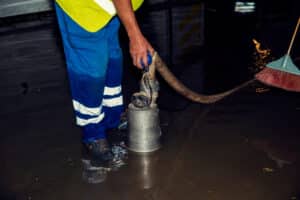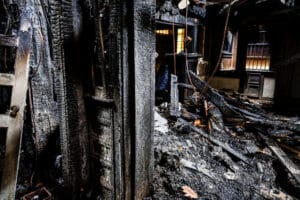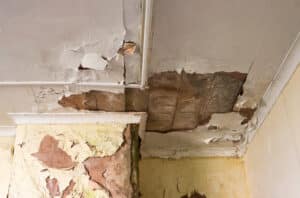Sewage damage is one of the trickiest forms of damage to clean. You might be surprised at how many things could cause sewage damage. This article will explore what causes it, why it shouldn’t be ignored, its possible health effects, and what to expect from a professional team during the cleanup process.
Sewage damage can be caused by a variety of factors, including:
- Clogged or damaged pipes: Blockages or damage to sewage pipes can cause backups and overflows, leading to sewage damage.
- Tree roots: Tree roots can grow into sewage pipes, causing blockages and damage.
- Heavy rain: Heavy rain can overwhelm sewage systems and cause backups and overflows.
- Flooding: Flooding can cause sewage systems to become overwhelmed, leading to backups and overflows.
- Malfunctioning septic systems: Malfunctioning septic systems can cause sewage backups and overflows, leading to sewage damage.
- Aging infrastructure: Aging sewage infrastructure, like pipes and treatment plants, can become damaged or malfunction over time, leading to sewage damage.
- Human error: Human error, such as flushing non-biodegradable items down the toilet or pouring grease down the drain, can cause blockages and damage to sewage systems.
- Natural disasters: Natural disasters like hurricanes, earthquakes, and tornadoes can cause damage to sewage infrastructure, leading to sewage backups and overflows.
- Industrial accidents: Accidents in industrial settings, such as chemical spills, can cause damage to sewage systems and lead to sewage backups and overflows.
- Municipal sewer line backups: Municipal sewer line backups can occur due to blockages or other issues in the public sewage system, causing sewage backups and overflows into homes and businesses.
- Frozen pipes: In cold weather, pipes can freeze and burst, causing sewage backups and overflows.
- Improperly installed plumbing: Improperly installed or maintained plumbing can lead to leaks and other problems that can cause sewage backups and overflows.
- Building construction: Construction activity can damage or disturb sewage infrastructure, leading to sewage backups and overflows.
- Neglected maintenance: Not properly maintaining sewage systems can lead to blockages, malfunctions, and backups that can cause sewage damage.
- Vandalism: Vandalism of sewage systems, such as intentionally blocking pipes or damaging treatment plants, can cause sewage backups and overflows.
It’s important to clean up sewage damage immediately for several reasons:
- Health risks: Sewage contains harmful bacteria, viruses, and other microorganisms that can cause serious health problems, including infections and diseases. The longer the sewage is left untreated, the higher the risk of exposure to these contaminants.
- Property damage: Sewage damage can cause significant damage to your property, including flooring, walls, furniture, and other personal belongings. The longer the sewage is left untreated, the more extensive the damage can become.
- Odor: Sewage can produce a strong and persistent odor that can be difficult to remove. The longer the sewage is left untreated, the more difficult it can be to eliminate the odor.
- Structural damage: Sewage can weaken the structural integrity of your property, including the foundation, walls, and framing. The longer the sewage is left untreated, the greater the risk of structural damage.
- Legal and financial consequences: Failure to clean up sewage damage can result in legal and financial consequences, including fines and lawsuits. Insurance companies may also deny coverage if the damage is left untreated for too long.
- Peace of mind: Cleaning up sewage damage immediately can give you peace of mind and help you feel safe and secure in your home or business.
It is important to take immediate action to address the problem and prevent further damage and health risks related to harmful microorganisms, chemicals, and other contaminants.
Here are some of the health risks associated with sewage damage:
- Bacterial infections: Sewage contains various bacteria that can cause infections, including E. coli, Salmonella, and Shigella. Exposure to these bacteria can cause symptoms such as fever, diarrhea, vomiting, and abdominal pain.
- Viral infections: Sewage may contain viruses such as hepatitis A, norovirus, and rotavirus, which can cause various illnesses.
- Parasitic infections: Parasites like Cryptosporidium and Giardia can be found in sewage and cause diarrhea and other gastrointestinal symptoms.
- Mold exposure: Sewage damage can also lead to mold growth, which can cause respiratory problems like coughing, wheezing, and asthma attacks.
- Chemical exposure: Sewage may contain a variety of chemicals, including pesticides, heavy metals, and industrial chemicals, which can be harmful to human health if ingested or inhaled.
- Foul odors: Sewage damage can produce unpleasant and potentially harmful odors that can cause headaches, nausea, and other symptoms.
- Psychological effects: Exposure to sewage damage and the associated health risks can also cause psychological effects such as anxiety and stress.
Sewage damage can pose serious health risks and should be addressed immediately by a professional cleanup crew to ensure that the affected area is properly cleaned and disinfected and that any potential health risks are minimized.
Sewage damage cleanup can be tricky, which is why you should hire a professional. If you hire a professional to handle sewage damage cleanup, you can expect them to take the following actions:
- Assessment: The professionals will assess the extent of the damage, identify the sewage’s source, and determine the appropriate cleanup method.
- Safety precautions: The professionals will take appropriate safety precautions, such as wearing personal protective equipment (PPE) and isolating the affected area to prevent cross-contamination.
- Removal of standing water: The professionals will remove standing water and sewage from the affected area using specialized equipment, such as pumps and vacuums.
- Cleaning and disinfection: The professionals will clean and disinfect the affected area using specialized cleaning agents and equipment to remove all traces of sewage and harmful contaminants.
- Drying and dehumidification: The professionals will use specialized equipment such as fans and dehumidifiers to dry out the affected area and prevent mold growth.
- Restoration: The professionals will repair or replace damaged materials, such as flooring, drywall, and insulation.
- Deodorization: The professionals will use specialized equipment to remove any unpleasant odors associated with sewage damage.
- Testing: The professionals may perform testing to ensure that the affected area has been properly cleaned and disinfected and that there is no risk of harmful contaminants.
- Documentation: The professionals will provide documentation of the cleanup process, including before and after photos, to support insurance claims and other legal purposes.
Hiring a professional for sewage damage cleanup ensures that the affected area is properly cleaned and disinfected, minimizing health risks, and preventing further damage to the property.
Black Diamond Restoration Can Help
Black Diamond Restoration provides 24/7 sewage, water, mold, fire, smoke, and storm damage restoration to the greater Salt Lake and Utah Valley areas. Call us at 801.512.4194 to schedule your service.
toto slot